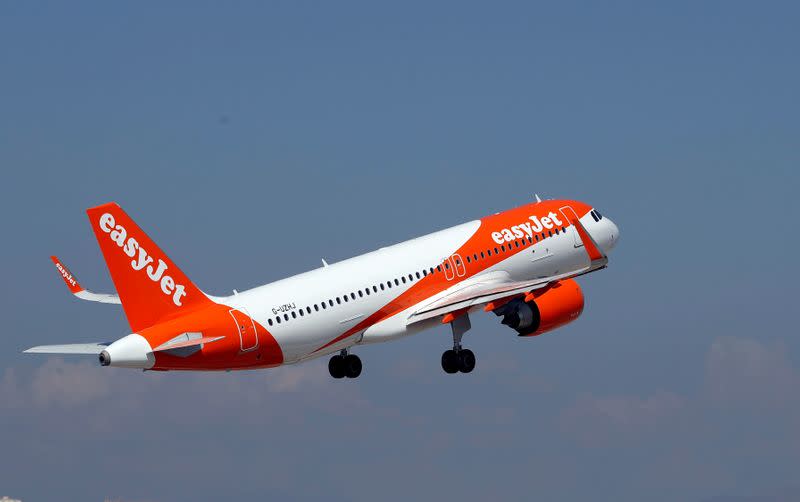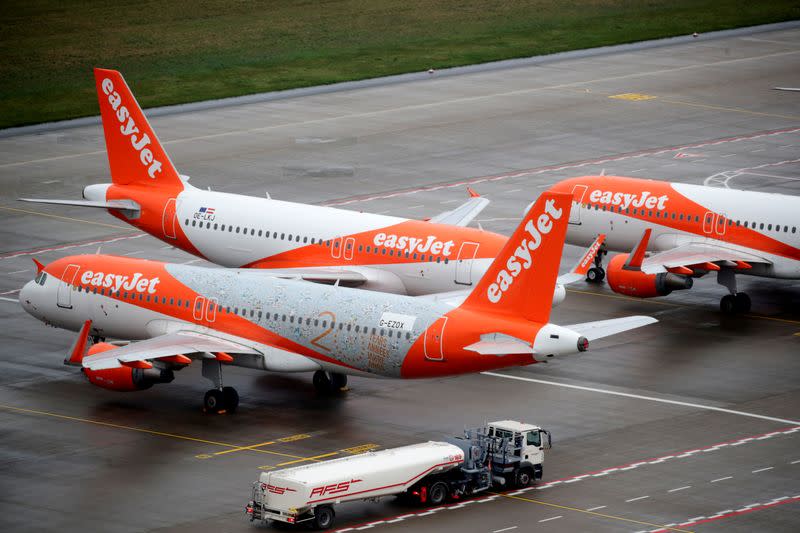Holiday bookings soar as Britons hope for travel restart
By Sarah Young
LONDON (Reuters) - Britons rushed to book foreign holidays after the government laid out plans to gradually relax coronavirus restrictions, giving battered airlines and tour operators hope that a bumper summer could come to their rescue.
Bookings flooded in on Monday evening and Tuesday following the government's announcement on Monday that travel could restart from mid-May, with Spain and Greece the most popular destinations, airlines and holiday companies said.
EasyJet said that bookings on its flights from Britain for this summer had jumped by more than 300% compared to a week ago and bookings for its summer holiday packages had increased by more than 600% compared to a week earlier.
Holiday company TUI UK said that its bookings had surged 500% compared to a week ago, while holiday and airline group Jet2 said its bookings had increased by more than 600%.
The companies did not give precise numbers of bookings, and industry sources said the increases were likely to be from very low levels last week. Uncertainty over trips had stopped demand in what is usually a key winter booking period with cash flowing in.
This summer is make-or-break for many airlines and holiday companies which are struggling to survive with close to a year of almost no revenue due to pandemic restrictions. Without it many will need extra funds after burning through cash reserves.
There is still uncertainty over exactly how and when international routes can reopen, but the surge in bookings nevertheless helped travel stocks.
Shares in easyJet were up 8% in afternoon trading, hitting their highest level since last March, while shares of BA-owner IAG were 3% higher, and Jet2 was up 1.5%.
While British tourists are some of the biggest spenders in Europe, the presence of a more infectious variant of coronavirus in the UK could still hinder holiday plans. France and Spain have shut their borders to most UK travellers due to variants.
UK holidaymakers will know more on April 12 when the government publishes a travel review. It has said that a lockdown ban on most international travel will stay until at least May 17.
That should give airlines time to plan their summer schedule, a process which takes months.
Travel site Skyscanner said flight bookings made on Monday were 69% higher than the previous day. Spain was the top destination.
"Our data shows that travellers are very well tuned into any updates about restrictions. We are seeing this latest news translate into a surge in travel demand," said Skyscanner flights chief Hugh Aitken.
Both TUI and Jet2 said destinations in Greece, Spain and Turkey were the most booked, with people opting to go from July onwards. British Airways said searches for holidays on its website had tripled since the government's announcement.
EasyJet said people were booking trips to beach resorts with holidaymakers keenest to travel in August. The airline also sought to take advantage of the holiday rush to put on sale its flights for spring and summer next year, a move which could help it rebuild cash reserves depleted during the pandemic.
Britain's route back to normality is helped by rapid progress with its vaccine plan. Over 17.7 million people, or a quarter of the population, have already had a first dose of the jab. The government is also considering options for vaccine passports.
Sounding a note of caution, Bernstein analysts warned that slower vaccine programmes in mainland Europe could still scupper the recovery in cross-border tourism this summer.
"Unless that meaningfully improves in short order, we worry that governments will be unwilling to lift restrictions by summer," Bernstein's Daniel Roeska said.
Airlines and travel companies hope travel to Europe will open up and that progress on Britain's vaccination programme will mean that from May 17 the UK will end its holiday ban and remove a 10-day quarantine requirement, a big deterrent for holidaymakers, and some of its COVID-19 testing rules.
(Reporting by Sarah Young, Editing by Paul Sandle and Susan Fenton)


